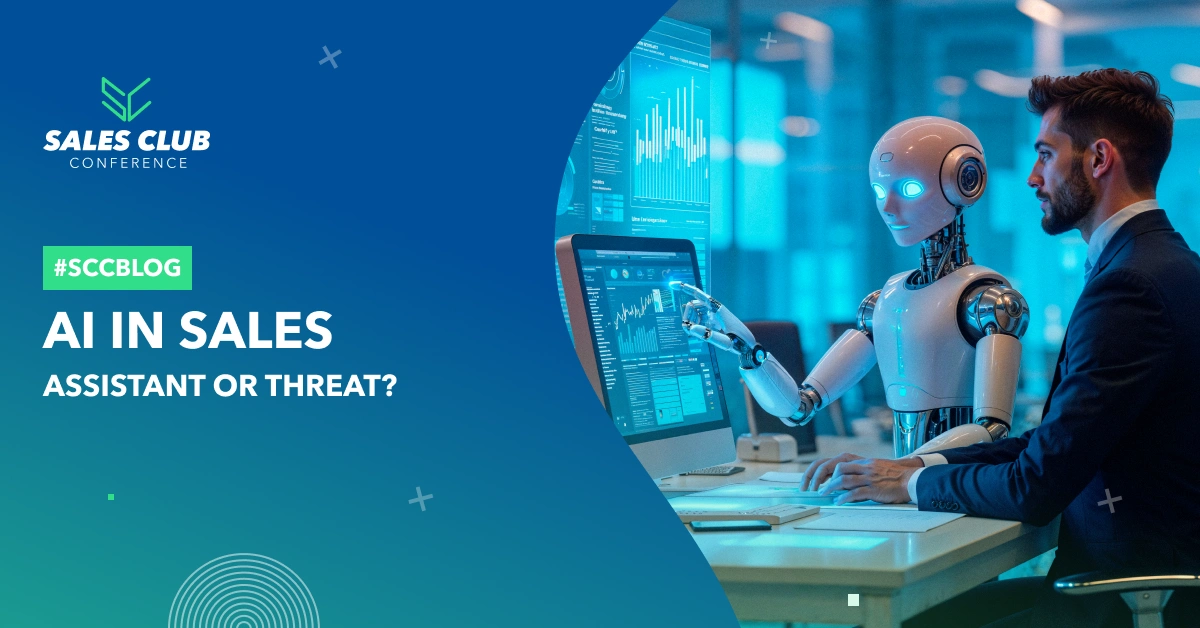Blog " AI in Sales – Assistant or Threat?
Artificial Intelligence (AI) is no longer a distant future—it is here and transforming the way we do business. More and more companies are integrating AI sales tools to gain time, precision, and a competitive edge. That is why in the Sales Club the topic of artificial intelligence in business is among the most discussed ones. From automated email campaigns to chatbots and predictive analytics, AI offers limitless opportunities for optimization. But with progress comes concern: will machines replace humans? Is AI a reliable ally in the sales process or a real threat to those working in sales?
How AI Is Transforming the Sales Landscape
Automation of Routine Tasks
One of the main benefits of AI in sales is automation. AI-powered software solutions are already handling tasks such as:
- processing customer inquiries;
- personalizing marketing messages;
- analyzing the behavior of potential customers;
- creating email sequences.
These automations not only save salespeople time but also increase the accuracy and speed of actions taken. For example, AI can analyze hundreds of messages and respond to customer inquiries that would otherwise take hours of manual work. This frees sales professionals to focus on the strategic and emotional aspects of the sales process, which require a human touch and intuition.
Better Targeting and Anticipating Customer Needs
AI analyzes vast amounts of data to identify patterns in consumer behavior. Through machine learning and audience data analysis, AI can predict which products are most likely to interest specific customers in the future.
This allows sales teams to:
- predict when a customer is ready to complete a purchase;
- understand which products the customer is interested in;
- offer personalized deals at the right moment.
The result? Higher efficiency and less wasted time for salespeople, who can focus on more complex tasks such as building relationships and negotiating deals.
The Advantages of AI for the Sales Team
1. Increased Productivity
AI tools such as AI-powered CRM systems, automated reports, and conversation analyzers significantly boost salespeople’s efficiency. The time they would normally spend on administrative tasks can now be invested in real meetings, negotiations, and closing deals. For example, with AI conversation tools, sales teams can easily analyze client negotiations to identify what works and what doesn’t—thus optimizing their future strategies.
2. Personalization of the Customer Experience
Today’s consumers expect personalized offers and individual attention. AI helps companies meet these expectations by:
- behavioral analysis;
- dynamic content;
- adaptive real-time campaigns.
With the help of AI, companies can create personalized offers that match the specific needs and interests of each customer. This increases the likelihood of successful sales while also enhancing the overall customer experience.
3. Better Forecasting and Decision-Making
AI-powered systems offer “intelligent forecasting”—analyzing past sales, seasonality, and even economic trends to provide reliable predictions for the future. This helps managers in planning and resource management, as AI can forecast peak periods when marketing efforts need to be intensified or sales teams expanded.
The New Role of the Salesperson in the AI Era
With the rise of artificial intelligence, the role of the salesperson is undergoing a major transformation. Instead of being merely an executor of tasks such as lead tracking, sending offers, and data administration, today’s salesperson is evolving into a strategic consultant and relationship expert.
AI handles the routine work, while humans bring the added value—understanding, empathy, flexibility, the ability to improvise, and the capacity to build long-term trust.
This shift requires the development of new skills:
- Tax and Strategic Analysis
- Working with AI Tools
- Communication Intelligence and Emotional Influence
- Flexibility in Hybrid Interaction (Online and Offline)
The salesperson is no longer just a “seller,” but a partner in the client’s decision-making process. This elevates sales to a new level—from transactions to genuine, value-driven relationships.
The Psychological Aspects of AI in Sales
While technology can increase sales efficiency, it also raises an important question about the psychological effects on customers. How does AI influence consumer perception, and how does it affect their trust? Often, when customers interact with software or chatbots, they may feel distant and depersonalized. It is crucial for companies to be mindful of how they use AI so that it doesn’t completely replace the human element that builds emotional connections and trust. AI can be a tool for fast service, but human sensitivity and the ability to understand customer needs remain irreplaceable.
AI as a Threat: What Do We Lose When the Human Element Is Missing?
1. Lack of Empathy and Intuition
No matter how “smart” AI becomes, it cannot replace human intuition, emotional intelligence, and the ability to build relationships. Sales often happen based on “gut feeling,” and that is something machines cannot master. For example, when a salesperson is in negotiations with a client, they may sense that something is off—even if the client doesn’t say it outright. This inner sensitivity is something AI cannot replicate.
2. Devaluation of the Salesperson’s Role
Many salespeople fear that AI could make their skills obsolete. The truth is, their role will shift—from executor to consultant. But if they don’t adapt in time, they truly risk being left out of the market. To succeed in the future, sales professionals must develop new skills—such as analytical thinking and strategic planning—that complement the use of AI.
3. Ethical Risks and Privacy
AI systems process sensitive personal data, often without the full consent or understanding of the customer. If not used responsibly, these technologies can undermine the trust between salesperson and consumer. To avoid such risks, companies must implement clear data protection policies and ensure transparency regarding the use of AI in their business processes.
Как да използваме AI умно и балансирано
Invest in Training
AI is a tool. If salespeople know how to use it, it will optimize their work without replacing them. Companies should invest in training that demonstrates how AI can be integrated into the daily practice of their teams. Such training can cover both technical aspects (such as configuring CRM systems) and strategic ones (such as integrating AI into the sales process and building customer relationships).
Combine the Human Approach with Technology
The most effective sales will be hybrid—leveraging technology for speed and efficiency, while relying on humans for building relationships, negotiations, and trust. This way, the customer will feel they are receiving personalized attention while still benefiting from AI’s advantages in fast service and accurate recommendations.
AI and the Evolution of Customer Experience
AI not only optimizes internal processes but also plays a key role in enhancing the customer experience. Through machine learning and big data processing, AI can predict not only consumers’ needs but also suggest solutions they didn’t even realize they wanted. These technologies can analyze customer behavior at different stages—from initial interest to purchase completion and even post-sale service. Such smart predictions and personalized recommendations lead to higher satisfaction while increasing the likelihood of repeat purchases and long-term relationships.
This integration between AI and customer experience not only provides competitive advantages but also increases trust between brands and their consumers. Customers feel that their needs are recognized and met at every stage, which strengthens loyalty and encourages positive feedback. In addition, AI can analyze social media to capture customer sentiment in real time and suggest adjustments to communication strategies. This gives sales teams the opportunity to react quickly—something that is crucial in today’s competitive market.
Is Investing in AI Tools Worth It for Small Teams?
Small sales teams often operate with limited resources and time. That’s exactly why AI can be a major advantage—automating repetitive tasks, assisting with data analysis, and saving hours of manual work. The investment doesn’t have to be huge—today, there are affordable solutions that can be implemented quickly and effectively. For teams with a clear strategy and solid organization, AI isn’t an expense but a growth accelerator. Small teams can use AI to gather customer data, track behavioral trends, and optimize campaigns, leading to significant improvements in results.
If you want to learn more about modern approaches in sales, check out Sales Club.
Facing the Challenges of AI: How to Avoid the Pitfalls of Over-Automation
Despite the countless advantages AI offers, there is a risk of over-automation, which can depersonalize the customer experience. If technology is overused, salespeople may lose sight of important aspects of customer interaction that require personal attention and engagement. Customers may feel neglected when faced with standardized, impersonal responses and offers that fail to reflect their specific needs. That’s why it is essential to find the right balance between automation and human contact. AI should be used to support the salesperson, not to replace them entirely. Companies must carefully consider how and when to include the human element in their processes and use AI as a complement to—not a substitute for—personal interaction.
Conclusion: AI Is Not a Threat If We Use It Correctly
Artificial intelligence sparks both fears and excitement, but at its core, it is simply a tool—one that becomes what we choose to make of it. If we use it wisely, with clear ethics, human judgment, and responsibility, AI can become a powerful ally—helping us solve complex problems, save time and resources, grow businesses, and improve quality of life.
The real threat does not come from the technology itself, but from how people choose to apply it. If we stay informed, uphold standards, and continue to put humans at the center of processes, artificial intelligence will not mark the end of anything—but rather the beginning of a new era with more opportunities than risks.
Artificial intelligence is not meant to replace salespeople but to help them become better at their work. In a world where customers expect speed, accuracy, and personalized attention, AI is an ally, not a threat—provided it is used wisely. The true power lies in the balance between technology and the human touch. It is the sales professionals who combine these two approaches that will be the winners in tomorrow’s market.







